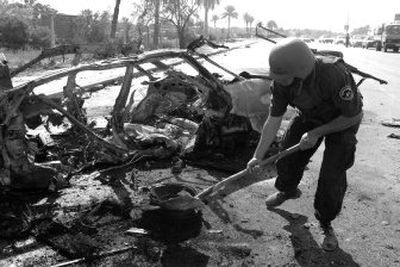Iraq bombs kill 130 as envoy sworn in

BAGHDAD, Iraq – A devastating series of bombings in a crowded market in a Shiite Muslim neighborhood of Baghdad and in a predominantly Shiite town north of the capital killed more than 130 Iraqis on Thursday, the same day a new U.S. envoy asserted at his swearing-in that the U.S. mission in Iraq was not an “impossible” one.
The bombings, part of a pattern of attacks in predominantly Shiite areas, threatened to inflame sectarian tensions that are at boiling point across much of Iraq. U.S. officials believe the attacks are part of a systematic effort by al-Qaida militants to foment violence by Shiite militias and scuttle the latest U.S. security effort.
Thursday’s attacks in the capital’s Shaab neighborhood and in the town of Khalis, in volatile Diyala province, appeared to have been meticulously synchronized to inflict severe casualties.
In Baghdad’s Shalal market, two suicide bombers struck almost simultaneously at either end of a dense maze of shopping stalls, killing 80 people and injuring more than 100.
“The flesh of one man’s face was stripped to his skull,” said Ahmed Laith, who sold inexpensive nylon tracksuits from a booth in the center of Shalal market.
In both locations, the bombs exploded moments apart, close to 6 p.m., an hour when the streets were full of shoppers hurrying to buy provisions. The timing of the explosions appeared designed to ensnare would-be rescuers and those who rushed to search for loved ones caught in the initial blasts.
In Khalis, about 40 miles north of Baghdad, four powerful vehicle bombs exploded in quick succession within a radius of less than half a mile. Body parts were hurled in all directions, eyewitnesses said.
At least 52 people were killed and about 80 more injured in the coordinated assault, officials said.
“I saw a man from a family I know carrying his son’s burned and charred body,” said 36-year-old Ahmed Mahmoud. “He was screaming like a madman.”
The fresh round of bloodletting underscored the enormous difficulty of the task being taken up by Ambassador Ryan C. Crocker, a Spokane native and career diplomat who had once warned that the U.S. invasion of Iraq and the toppling of Saddam Hussein could set off spiraling strife between Iraq’s Sunnis and majority Shiites.
Crocker, 57, told an audience, mainly workers at the embassy where the ceremony was held, that security was “without question” the central issue in Iraq.
“Terrorists, insurgents and militias continue to threaten security in Baghdad and around the country,” he said. Fulfilling U.S. goals in Iraq would be hard, he said, but added: “If I thought it was impossible, I would not be standing here today.”
Crocker served a brief stint in Baghdad as director of governance under the Coalition Provisional Authority in 2003.
A fluent speaker of Arabic, Crocker paid tribute to Iraqi employees of the embassy, telling them in their own language: “You are the heroes or the country, in the true sense of the word.”
Thursday’s wave of attacks came two days after a pair of truck bombs in a largely Shiite area of the town of Tall Afar, near the Syrian border, killed more than 80 people and triggered a round of reprisal killings that local officials said left more than 70 Sunni men dead. The U.S. military on Thursday contested that figure, saying the death count was closer to 30.
The mayor of Nineveh province, where the predominantly Turkomen town is located, said 18 policemen were arrested by Iraqi troops, but all were released.